Boston to Los Alamos (June 1994)
by Philip Greenspun
Home : Travel : Footsteps : One Section
Exactly 100 years ago, Robert Frost presented a book of poetry to a
young woman in Boston. She summarily rejected both the poems and the
20-year-old Frost. Frost resolved to throw himself into the Great
Dismal Swamp just south of Norfolk, Virginia. He traveled to Norfolk
by train and steamer and was on the point of hurling himself into the
swamp when he thought better of it. He hopped aboard a steamer full
of drunken hunters cruising down the canal and ended up in Elizabeth
City, North Carolina.
Professor Big Shot rejected my area exam paper and me. I drove to Norfolk,
Virginia and then continued along the very same canal (now part of the
Intracoastal Waterway) to Elizabeth City, North Carolina where I
stayed the night. Frost's age was divisible by 10; so was mine (30).
Enough similarities for a Kennedy assassination theory so far. What
were the differences? Frost wanted to kill himself; I wanted to kill
Professor Big Shot. Frost left on Election Day; I had no thoughts of
politicians to drive me to despair.
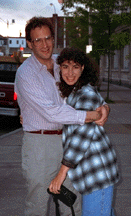 Saturday, June 4, 1994
Saturday, June 4, 1994
I packed until 2:30 am, taking half as much as last year--the year of
Travels with Samantha--by leaving out everything I hadn't used.
I developed a new philosophy for packing cameras: I bought the largest
camera bag in the world, tossed in cameras until it was full and left
out the rest of my photographic armamentarium. I woke up at 8 am
anxious to do battle on the Jersey Turnpike and arrived in beautiful
Mahwah, New Jersey to inspect Cousin Lynn's first child. The baby
seemed to have the right number of arms and legs, but the apartment
crowded with friends, the noise of the (unwatched) television,
furniture, and bric-a-brac made me long for the high desert and open
road.
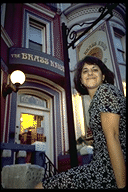 I arrived in Washington, DC for a Senegalese dinner with
Meredith, a
public interest lawyer. The food was pretty good but the national
drink of Senegal, sorel mixed with vanilla, made me understand why
Coke is so popular in the Third World. Northwest DC always strikes me
afresh with its beautiful architecture and endless yuppie playgrounds.
Northwest DC has Georgetown, Adams-Morgan, Dupont Circle, "the New U
Street", and nearly everyone who lives in Northwest makes enough money
to enjoy it all. There is an association and job for everyone here.
Meredith and I sat in wonder at the beautiful brick townhouse that
serves as the headquarters for the Association of Special Libraries.
I arrived in Washington, DC for a Senegalese dinner with
Meredith, a
public interest lawyer. The food was pretty good but the national
drink of Senegal, sorel mixed with vanilla, made me understand why
Coke is so popular in the Third World. Northwest DC always strikes me
afresh with its beautiful architecture and endless yuppie playgrounds.
Northwest DC has Georgetown, Adams-Morgan, Dupont Circle, "the New U
Street", and nearly everyone who lives in Northwest makes enough money
to enjoy it all. There is an association and job for everyone here.
Meredith and I sat in wonder at the beautiful brick townhouse that
serves as the headquarters for the Association of Special Libraries.
Luxurious accommodations awaited me at my brother Harry and
sister-in-law Julie's palatial suburban residence. Meredith and Harry
are my two most faithful Internet correspondents in Washington, DC and
I decided to concentrate my 36 hours on them. It felt a bit harsh to
scratch my parents and sister from the touring program, but they
weren't on Internet, hadn't been listening carefully in phone
conversations, and hence had only a vague out-of-date notion of who I
was.
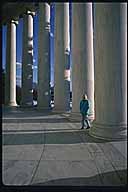 Meredith and I went to see Comedy of Errors at an amphitheater
in Rock Creek Park on Sunday. The production was superb, the theater
plush, the sound system magnificent, and the tickets ... free! This
didn't strike Meredith or her friends as odd. They don't find it
unusual that most city parks are national parks and hence citizens in
Des Moines are paying for their circuses. Afterwards we visited the
Jefferson Memorial, Meredith's favorite spot in the city.
Meredith and I went to see Comedy of Errors at an amphitheater
in Rock Creek Park on Sunday. The production was superb, the theater
plush, the sound system magnificent, and the tickets ... free! This
didn't strike Meredith or her friends as odd. They don't find it
unusual that most city parks are national parks and hence citizens in
Des Moines are paying for their circuses. Afterwards we visited the
Jefferson Memorial, Meredith's favorite spot in the city.
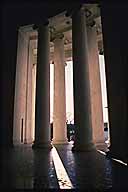 Standing under Jefferson's words about how government would improve as
men's minds became more developed and advanced, Meredith said "I
wonder what Jefferson would be if he were alive today? Maybe
something like Al Gore." I almost choked from horror. A follower of
Locke who held property sacred and wanted to free men from arbitrary
authority presiding over a government that lets law enforcement agents
nationwide take whatever they want in the name of the Drug War? Take
Jefferson's mind, advance it a bit and get ... Al Gore?!?
Standing under Jefferson's words about how government would improve as
men's minds became more developed and advanced, Meredith said "I
wonder what Jefferson would be if he were alive today? Maybe
something like Al Gore." I almost choked from horror. A follower of
Locke who held property sacred and wanted to free men from arbitrary
authority presiding over a government that lets law enforcement agents
nationwide take whatever they want in the name of the Drug War? Take
Jefferson's mind, advance it a bit and get ... Al Gore?!?
We couldn't come with anything more likely though. A bohemian
embittered and struggling in Greenwich Village? A government
professor at Harvard? Getting denied tenure at a crummy small liberal
arts school? A politician, God forbid? The division of labor in our
society seems to preclude the possibility of a man like Jefferson.
How could he do architecture without sticking to that and becoming a
monodimensional specialist? Philosophy without becoming a wanna-be
formalist? Political science without being a faintly ridiculous
professor or sleazy politician? If you figure this out, please let me
know.
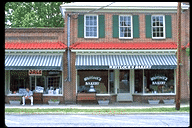
Monday, June 6
Woke at 9:30, long after Harry and Julie had departed to anesthetize
the sick, train young MDs advancing to the ranks of the $300,000/year
specialists, and gather data for research. I left the Beltway and its
heavy trucks (unfamiliar to one who lives in post-industrial
Massachusetts) for Maryland Rt. 5 and the beginning of the Bible Belt:
the Evangele Ministry's huge backlit sign "Free ticket to Heaven.
Inquire within, Sunday 10 am." After I crossed the Potomac, Virginia
greeted me with pastoral beauty all the way to Tappahannock, a town
founded slightly earlier than Williamsburg (early 1600s).

I continued on scenic highway 17 all the way to Norfolk's latest
attraction: Nauticus, "a celebration of the sea." Mostly it seemed
like a celebration of getting people to shell out $10 to expose
themselves to Navy and corporate PR. The "Shipbuilding US" film, for
example, was all about how American shipyards build the world's finest
ships but can't compete in the merchant market because the Feds won't
subsidize their poor little souls. The Aegis missile simulation was a
group interaction event with voting. Various threats presented
themselves and eight of us voted for one of four actions each time.
At first, when the threats were vague, we did OK, sending a fighter to
investigate an unknown far away plane or a helicopter to investigate
and unknown sub. Specific threats, however, revealed that none of the
others had absorbed any of the lessons about which weapon was good for
what. They picked ship-to-ship missiles, for example, to knock down
incoming missiles. My lone 12% kept showing up on the correct box
with the rest of the votes distributed randomly. Our incompetence
sank the ship and occasioned a lecture on how Aegis technology has
ushered in a wonderful new world where this isn't possible--the Aegis
cruiser that shot down an Iranian passenger jet by mistake wasn't
mentioned.
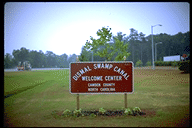
Under heavy thunderstorms I traced Robert Frost's steps along the edge
of the Great
Dismal Swamp to Elizabeth City. The swamp looks pretty wild and
it was easy to believe the local tales of people living back there,
eating possum, keeping their children out of school, and speaking an
archaic dialect of English. Elizabeth City looked decrepit from the
highway, but Katherine's directions took me into a lovely enclave for
the local gentry. Katherine is George's "grandmother" and remains
surrounded by Samoyeds. Five years ago, she was just divorced and
struggling to survive after twenty years as a homemaker and dog
breeder while I was the company president. Now she's president of a
50-person manufacturing firm and lives on the water with a Ferrari 308
GTS in the garage (I decided that if I could drive a Ferrari with the
top down on a sunny day once a week that it would be enough to keep me
happy) while I'm a destitute graduate student. She took me out for
dinner.
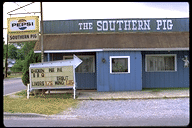
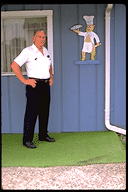
Tuesday, June 7, 1994
On the way to breakfast, Katherine and I stopped to take a picture of
The Southern Pig barbecue joint. Tom, the near white-haired owner,
walked out in a grease-spattered shirt and introduced himself. "We've
been doing ribs here for 14 years." Katherine noted that "they are
right in the middle of an all-black neighborhood but all the customers
are white."
Stalk himself was missing from Stalk's, which disappointed Kathy, but
the ham biscuit (ham dried and smoked for the better part of a year
then fried and dumped in the middle of a heavy biscuit) and egg
sandwich on wholewheat washed down with fresh-squeezed orange juice
were excellent. By Blue Highways standards, this place was a
loser, having zero calendars on the walls. However, with its expanses
of stainless steel and linoleum, smokers (1 out of 12 people in NC
have financial ties to tobacco; there are very few restrictions on
smoking), and big round table in the back full of guys chewing the
fat, it had plenty of local color. Kathy went off to work with two of
her Sammies (Juliet and Diva) and I shook off the ghost of Robert
Frost and headed NE toward the Outer Banks.
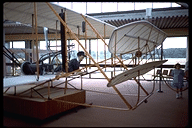 My first stop was the Wright Brothers Memorial, commemorating their
December 17, 1903 first powered flight (Orville went first).
Everything I'd thought about the flight was wrong. I'd always thought
it was on the beach at Kitty Hawk, but it turns out to have
been a few hundred yards inland at Kill Devil Hills, which is
four miles south of Kitty Hawk. They picked the spot because it was
broad, flat, and soft. I'd always thought the Wright Brothers figured
out how to fly. In fact, everyone knew how to fly and the Wright
Brothers used the published results of others. What Wilbur and
Orville figured out was a reasonable control system for an airplane.
The Feds display a nice full-size replica and show how the controls on
the Kitty Hawk Flyer are coordinated and afford control over roll,
pitch, and yaw just like a modern airplane. Although MIT had no
direct role in this flight, MIT nerds may have provided a lifestyle
example to the brothers. They were bachelors who lived with their
sister and father in Dayton, Ohio, and spent all their time working.
My first stop was the Wright Brothers Memorial, commemorating their
December 17, 1903 first powered flight (Orville went first).
Everything I'd thought about the flight was wrong. I'd always thought
it was on the beach at Kitty Hawk, but it turns out to have
been a few hundred yards inland at Kill Devil Hills, which is
four miles south of Kitty Hawk. They picked the spot because it was
broad, flat, and soft. I'd always thought the Wright Brothers figured
out how to fly. In fact, everyone knew how to fly and the Wright
Brothers used the published results of others. What Wilbur and
Orville figured out was a reasonable control system for an airplane.
The Feds display a nice full-size replica and show how the controls on
the Kitty Hawk Flyer are coordinated and afford control over roll,
pitch, and yaw just like a modern airplane. Although MIT had no
direct role in this flight, MIT nerds may have provided a lifestyle
example to the brothers. They were bachelors who lived with their
sister and father in Dayton, Ohio, and spent all their time working.
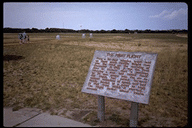
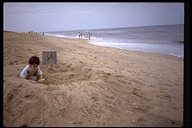
After a quick dip in the 60 degree water, I lunched at Pigman's
Bar-B-Que. This may be the Bible Belt, but there are portions of
Leviticus that seem to be widely ignored. I'd planned to linger on
the Outer Banks, but the lack of culture, hazy skies, and stiff wind
made me press on over hours of highway and ferries to the industrial
blight of Morehead City on the mainland. If you've been to Cape Cod,
I'd skip the Outer Banks altogether. The scenery is similar but if
the weather is bad the Outer Banks have no bookstore/cafes in which to
linger.
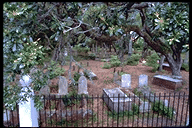
Wednesday, June 8, 1994
I toured around beautiful seaside Beaufort, NC
(pronounced bow-FORT
unlike beautiful seaside Beaufort, SC, which is bew-FURT) and then
drove mile after weary mile on rainswept undivided roads to
Charleston, SC.


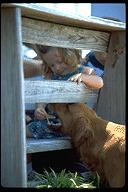
Thursday through Saturday
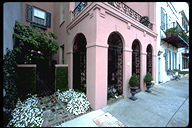 George Washington visited Charleston in
1791 and excerpts from his diary show that he was most impressed by
the hundreds of beautiful and well-dressed women. Things haven't
changed much and it didn't surprise me to learn that South Carolina
was home to both the most recent Miss America and Miss USA. If Boston
reflects Puritan England, Charleston reflects the Restoration England
of Charles II. Everything is perfectly set up for hedonism. Want a
gourmet meal at 10 pm at half the price you'd pay in Boston? You got
it. A sunset horsedrawn carriage ride around the waterfront and
gracious mansions? Choose your driver. Hungry for some Belgian
chocolates? No problem. Counterbalancing this hedonism to some are
the large number of families who live downtown. Charleston is rather
like Manhattan in that respect, something that sets both apart from
most American cities.
George Washington visited Charleston in
1791 and excerpts from his diary show that he was most impressed by
the hundreds of beautiful and well-dressed women. Things haven't
changed much and it didn't surprise me to learn that South Carolina
was home to both the most recent Miss America and Miss USA. If Boston
reflects Puritan England, Charleston reflects the Restoration England
of Charles II. Everything is perfectly set up for hedonism. Want a
gourmet meal at 10 pm at half the price you'd pay in Boston? You got
it. A sunset horsedrawn carriage ride around the waterfront and
gracious mansions? Choose your driver. Hungry for some Belgian
chocolates? No problem. Counterbalancing this hedonism to some are
the large number of families who live downtown. Charleston is rather
like Manhattan in that respect, something that sets both apart from
most American cities.
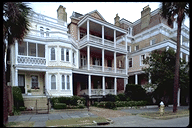 Charlestonians are proud of their history. "You're from Boston? Did
you know that eight years before the Boston Tea Party, we took over a
British fort and trained its guns on the ship bringing Stamp paper
here? The ship never came back." [Britain ultimately repealed the
Stamp Act, which made contracts illegal unless written on this
special, and expensive, paper.] "The Bostonians disguised themselves
as Indians, but we went as ourselves."
Charlestonians are proud of their history. "You're from Boston? Did
you know that eight years before the Boston Tea Party, we took over a
British fort and trained its guns on the ship bringing Stamp paper
here? The ship never came back." [Britain ultimately repealed the
Stamp Act, which made contracts illegal unless written on this
special, and expensive, paper.] "The Bostonians disguised themselves
as Indians, but we went as ourselves."
Charleston was also precociously violent in the Civil War. Cadets
from the Citadel opened fire on a boat resupplying Fort Sumter in
January, 1861 but real hostilities didn't break out until April, 1861
when lots of Confederate batteries simultaneously pummeled the fort,
kicking off the War Between the States (or "War of Northern
Aggression" or "Recent Unpleasantness" as locals are wont to call it).
History is palpable walking the grounds of the island fort or even on
James Island where I stayed. The all-black 54th Massachusetts fought
there while retaking Fort Sumter.
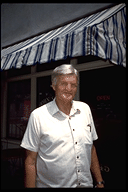 My favorite encounter was with Gerald, a sheep and cattle farmer from
the South Island of New Zealand, who is spending his 71st year touring
the US by Amtrak. His wife had died a year before, which broke his
heart, and he had Hodgkins Disease, but that didn't bother him: "I've
lived my three score and ten." I was reminded of what Anton, that
German doctor on the Heathrow-Stuttgart leg a year ago, said about why
he was moving to New Zealand: "people there die happy."
My favorite encounter was with Gerald, a sheep and cattle farmer from
the South Island of New Zealand, who is spending his 71st year touring
the US by Amtrak. His wife had died a year before, which broke his
heart, and he had Hodgkins Disease, but that didn't bother him: "I've
lived my three score and ten." I was reminded of what Anton, that
German doctor on the Heathrow-Stuttgart leg a year ago, said about why
he was moving to New Zealand: "people there die happy."
 I drove Gerald over to Patriot's Point, where one can tour the WWII
aircraft carrier Yorktown. Gerald had been in the war and
wouldn't talk about it except to say that it had been a horrific
experience. One side of his face was burned, but I never found out if
that was a consequence of combat. Gerald really liked the
Yorktown, though, and it brought back some happy memories also.
Memorials to "those who made the ultimate sacrifice" in various
theaters and on various vessels were strewn through the enormous ship.
The extensive kitchen, laundry, maintenance, and other support areas
made me realize how difficult it was to get just one guy up in the air
to fight that far from American shores.
I drove Gerald over to Patriot's Point, where one can tour the WWII
aircraft carrier Yorktown. Gerald had been in the war and
wouldn't talk about it except to say that it had been a horrific
experience. One side of his face was burned, but I never found out if
that was a consequence of combat. Gerald really liked the
Yorktown, though, and it brought back some happy memories also.
Memorials to "those who made the ultimate sacrifice" in various
theaters and on various vessels were strewn through the enormous ship.
The extensive kitchen, laundry, maintenance, and other support areas
made me realize how difficult it was to get just one guy up in the air
to fight that far from American shores.
I was disappointed to find that the Savannah, the only nuclear
powered merchant vessel ever built had been given away. The expense
of maintenance didn't justify its value as a tourist draw. This Atoms
for Peace showcase was ill-starred from Day One. She started her life
as a bulk carrier just as container ships became popular. In addition
to the usual nuclear power woes, her crew frequently struck for higher
pay.
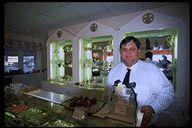 My luckiest find was Marc Lucas's chocolate shop. The voluble Lucas
was chatting with two local customers but conversation soon turned to
my new Canon cameras (replacing the Nikons stolen in Filthadelphia at
the end of last year's trip). The 35-350 zoom with lens hood turns
out to be a reliable conversation starter. Marc came over from
Belgium 12 years ago and is thoroughly immersed in the Charleston
milieu. "People in Boston are crazy. My brother works 80 hours a
week at Harvard Medical School trying to get grants and do research.
Everyone up there works hard for nothing. Nothing. Any one of them
could come down here and make a million dollars so easily. Most
people here have no concept of what it means to be educated,
intelligent, or hard working." I appreciated Lucas's enthusiasm and
insight, but not quite as much as the Neuhaus chocolate or
strawberries dipped in Belgian chocolate he gave me.
My luckiest find was Marc Lucas's chocolate shop. The voluble Lucas
was chatting with two local customers but conversation soon turned to
my new Canon cameras (replacing the Nikons stolen in Filthadelphia at
the end of last year's trip). The 35-350 zoom with lens hood turns
out to be a reliable conversation starter. Marc came over from
Belgium 12 years ago and is thoroughly immersed in the Charleston
milieu. "People in Boston are crazy. My brother works 80 hours a
week at Harvard Medical School trying to get grants and do research.
Everyone up there works hard for nothing. Nothing. Any one of them
could come down here and make a million dollars so easily. Most
people here have no concept of what it means to be educated,
intelligent, or hard working." I appreciated Lucas's enthusiasm and
insight, but not quite as much as the Neuhaus chocolate or
strawberries dipped in Belgian chocolate he gave me.
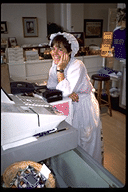 Leslie supplemented Marc's insight. "I grew up 40 miles south of here
along the coast." "On a farm?" I asked. "Get real! I told a girl
down in Daytona Beach that we lived in a house with a dirt floor and
rode a cow every day to a one-room schoolhouse. And she believed me.
Some people are idiots. My dad works for an insurance agency and my
mother was a receptionist at a mental health clinic. You wouldn't
like it in my small town; all people do for recreation is go hunting,
fishing, or shrimping. My grandmother used to hunt doves and bring
them back. I'd have to pop their necks and pluck them. We have
cousins who come up from Florida and they'd always bring alligator
tail.
Leslie supplemented Marc's insight. "I grew up 40 miles south of here
along the coast." "On a farm?" I asked. "Get real! I told a girl
down in Daytona Beach that we lived in a house with a dirt floor and
rode a cow every day to a one-room schoolhouse. And she believed me.
Some people are idiots. My dad works for an insurance agency and my
mother was a receptionist at a mental health clinic. You wouldn't
like it in my small town; all people do for recreation is go hunting,
fishing, or shrimping. My grandmother used to hunt doves and bring
them back. I'd have to pop their necks and pluck them. We have
cousins who come up from Florida and they'd always bring alligator
tail.
I went to college at Furman in Greenville. That's upcountry where
people are really hicks. All the students there are rich kids from
Atlanta or Bible thumpers. All they care about is who you know and
who your family is. I hated it so I came down here to the College of
Charleston and I never want to leave the Lowcountry."
The last sentence is key. People in Charleston consider themselves so
superior to and better off than the hicks surrounding them that they
are afraid to edge away from their little peninsula. You don't meet
people yearning to test their mettle in New York City or Los Angeles.
It is just too comfortable to ever leave.
At 22, Leslie had already had her fill of Southern men.
"I expect nothing from men and get less. I can't imagine myself
married because I haven't found a man I'd want to spend that much time
with."
What did men do to irritate and/or disappoint her?
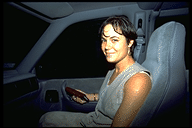 "Lie. All of them lie. They tell you they love you, that you're the
best, just so they can get into bed with you. Then you find out that
they are talking about you behind your back or seeing another girl.
That's just for starters. Men are control freaks. They love to show
off to their friends how much control they have over you. They think
that because I'm five foot nothin' that I'll be easy to control, but
then I let them have it for five minutes in front of their friends."
"Lie. All of them lie. They tell you they love you, that you're the
best, just so they can get into bed with you. Then you find out that
they are talking about you behind your back or seeing another girl.
That's just for starters. Men are control freaks. They love to show
off to their friends how much control they have over you. They think
that because I'm five foot nothin' that I'll be easy to control, but
then I let them have it for five minutes in front of their friends."
Sunday, June 12
 Transported by the magic of Interstate highways to Atlanta, I stopped
at the Martin Luther King birthplace. This area of town was once
inhabited by blacks of all economic and educational levels and was a
major center of black-owned business. The integration of the 60's
enabled the middle- and upper-class families to move to the suburbs
and now it is rundown. Well-dressed blacks and the occasional white
milled about King's tomb, which is surrounded by a fountain. A couple
of grey-haired substantial Indian women in more substantial saris sat on
the edge of the water for a picture. For me they completed the link
from Thoreau (On Civil Disobedience.) to Gandhi to King.
Transported by the magic of Interstate highways to Atlanta, I stopped
at the Martin Luther King birthplace. This area of town was once
inhabited by blacks of all economic and educational levels and was a
major center of black-owned business. The integration of the 60's
enabled the middle- and upper-class families to move to the suburbs
and now it is rundown. Well-dressed blacks and the occasional white
milled about King's tomb, which is surrounded by a fountain. A couple
of grey-haired substantial Indian women in more substantial saris sat on
the edge of the water for a picture. For me they completed the link
from Thoreau (On Civil Disobedience.) to Gandhi to King.
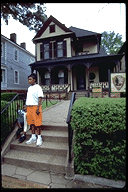
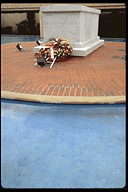
Photo at left shows the house in which Martin Luther King was born.
At right, the tomb in which he is buried
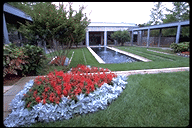
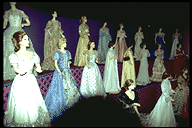 The Jimmy Carter Presidential Library does something amazing, i.e.,
make you believe that Carter was an immensely effective president. By
concentrating on Carter's achievements and ignoring failures, the
exhibits make it sound as though he spent four years working hard on
them and never wasted any time on failures. My favorite exhibit
explicitly stressed the importance of First Ladies; they were all
represented by dolls.
The Jimmy Carter Presidential Library does something amazing, i.e.,
make you believe that Carter was an immensely effective president. By
concentrating on Carter's achievements and ignoring failures, the
exhibits make it sound as though he spent four years working hard on
them and never wasted any time on failures. My favorite exhibit
explicitly stressed the importance of First Ladies; they were all
represented by dolls.
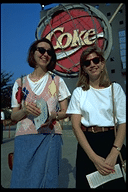 With Atlantans Becky and Rebecca, I walked down memory lane in the
World of Coca Cola. Actually I was walking down my
great-grandfather's and grandfather's memory lanes. Did you know that
Coca Cola always had caffeine? Except for the corn syrup in place of
sugar, Coke Classic is exactly the same as the 1886 formula, which
contained a flavoring extract of the coca leaf but not cocaine. It
still has the coca extract and Coca Cola is the world's largest legit
consumer of coca leaves.
With Atlantans Becky and Rebecca, I walked down memory lane in the
World of Coca Cola. Actually I was walking down my
great-grandfather's and grandfather's memory lanes. Did you know that
Coca Cola always had caffeine? Except for the corn syrup in place of
sugar, Coke Classic is exactly the same as the 1886 formula, which
contained a flavoring extract of the coca leaf but not cocaine. It
still has the coca extract and Coca Cola is the world's largest legit
consumer of coca leaves.
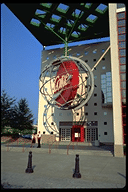 Becky and Rebecca's soft accents, slim bodies, and sophistication
stood in stark contrast to the more common products of the South. In
the North, good qualities are more uniformly distributed among the
populace. You might find an attractive, graceful person of average
intelligence and education. Or a plain looking person with a
brilliant mind. In the South, it is all or nothing. You are a slim
graceful well-spoken college-educated brunette or a corpulent
lumbering hick-accented uneducated dyed-blonde. There is very little
middle ground and it gives people on the good side of the divide ample
daily confirmation of their superior gifts and attainment.
Becky and Rebecca's soft accents, slim bodies, and sophistication
stood in stark contrast to the more common products of the South. In
the North, good qualities are more uniformly distributed among the
populace. You might find an attractive, graceful person of average
intelligence and education. Or a plain looking person with a
brilliant mind. In the South, it is all or nothing. You are a slim
graceful well-spoken college-educated brunette or a corpulent
lumbering hick-accented uneducated dyed-blonde. There is very little
middle ground and it gives people on the good side of the divide ample
daily confirmation of their superior gifts and attainment.
I spent the evening with Eric and Jody (Travels with Samantha
Chapter XI) and their 6-year-old Ryan and 3-year-old Austin. I
commented on their mansion-size house and they laughed "all our
friends live in houses twice as big." I was beginning to think that
Marc Lucas was right about people in Boston scratching out a meager
existence. We dined at Greenwoods, a Jewish-owned Southern restaurant
serving matzo ball soup and then the usual crawfish, crab cakes, and
other not-precisely-kosher local specialties. At the end of the meal,
during which serious conversation was difficult due to interruptions
from the boys, Jody asked me if I wouldn't just love this kind of
life. Eric rolled his eyes and I said that frankly I couldn't imagine
getting any creative work accomplished with this amount of
distraction.
Monday, June 13
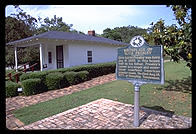
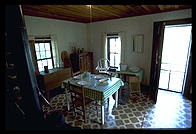 The trail from birth in Atlanta to death in Memphis that took Martin
Luther King, Jr. 39 years took me only one day. I even managed to
pick up the trail of Elvis at his birthplace in Tupelo, Mississippi.
Elvis was born in a
shabby two-room house and stayed in Tupelo for 13
years until his parents moved to a housing project in Memphis.
The trail from birth in Atlanta to death in Memphis that took Martin
Luther King, Jr. 39 years took me only one day. I even managed to
pick up the trail of Elvis at his birthplace in Tupelo, Mississippi.
Elvis was born in a
shabby two-room house and stayed in Tupelo for 13
years until his parents moved to a housing project in Memphis.
Parts of the ride were pretty scenic, although northern Mississippi
does not hit one over the head with its charms. My favorite part of
the ride were the mileage signs. US 78 goes straight from Birmingham
to Memphis and there isn't a town larger than Melrose in between.
Will a sign tell you the mileage to Memphis? No, but should you be
going to Holly Springs (population 7,300), you'll start seeing mileage
signs about 20 miles away. For awhile it puzzled me: Why would no
mileages greater than 30 be listed? Then it hit me: None of the
locals owned cars that would reliably make it farther than 30 miles.
The other highlight of the drive was crossing the infamous
Tennessee-Tombigbee canal. This child of a bunch of Southern
Democratic Congressmen and Senators left the US taxpayer reeling from
a multibillion dollar drain on the treasury. I was able to view a
one-mile section at midday; no barges were in sight.
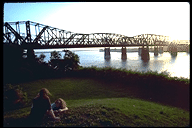 At 6 pm, I rolled into Judy, Jason, and Justin's pleasant mid-town
neighborhood and entered their elegant 1910 stone house. They took me
to Cafe Ole where we ate Mexican, watched the local counterculture,
and caught up on the months since we'd met in Alaska (
Travels with
Samantha Chapter XII).
At 6 pm, I rolled into Judy, Jason, and Justin's pleasant mid-town
neighborhood and entered their elegant 1910 stone house. They took me
to Cafe Ole where we ate Mexican, watched the local counterculture,
and caught up on the months since we'd met in Alaska (
Travels with
Samantha Chapter XII).
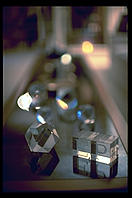 Tuesday, June 14
Tuesday, June 14
Jason, Justin and I made it out to Graceland for the 10 am tour of
Elvis's surprisingly modest house. My opinion of Elvis rose as I saw
that, if his taste wasn't always the most sophisticated, he didn't try
to impress people with his wealth. He bought the old brick house when
he was 22, retained its original name of Graceland, and lived there
until he died. It is true that he was prone to certain
eccentricities, such as shooting televisions, and that the last two
years of his life were sadly plagued by addiction to prescription
drugs. However, he is fondly remembered by all of Memphis for his
charity and generosity. He regularly gave $50,000 to various
organizations in town and didn't deduct it from his taxes because that
would "take away from the spirit of the gift." If he really liked his
barber or whomever, he would give him a Cadillac.
 Photo Tour of Graceland
Photo Tour of Graceland
Compare this for a moment to Bill Gates. Did you ever hear of Gates
giving a gift to another human being? The house Gates is building in
Seattle could practically contain the Graceland house and all its
surrounding horse pastures. If Elvis had gotten married in Hawaii
would he have chartered every helicopter on all five islands to
prevent anyone from flying over his wedding and photographing it?
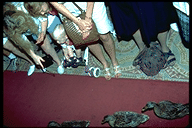 No visit to Memphis is complete without catching the Peabody Hotel's 5
pm Duck Walk. Throngs of people lined a red carpet as a group of
ducks climbed out of the lobby's central fountain and walked into the
elevator to ride up to their Duck Penthouse on the roof.
No visit to Memphis is complete without catching the Peabody Hotel's 5
pm Duck Walk. Throngs of people lined a red carpet as a group of
ducks climbed out of the lobby's central fountain and walked into the
elevator to ride up to their Duck Penthouse on the roof.
 Photo Tour of Memphis
Photo Tour of Memphis
Wednesday, June 15
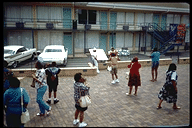 Having seen the end of Elvis's trail, I stopped at the Lorraine Motel
where Martin Luther King, Jr. was shot in 1968. I was struck by how
unlucky Memphis is to be associated with King's death. The
mostly-black sanitation workers were striking and King came up from
Atlanta to organize a march, which turned into a riot. He returned for
another try at peaceful demonstration and drifter/bum James Earl Ray
rolled into town and shot King on April 4th. Memphis really hadn't
anything to do with either man, but they've done a beautiful job
turning the motel into the National Civil Rights Museum. My favorite
exhibit was a real bus where the weight of your body on the seat
activates a recording telling you to move to the back. A solenoid
whacks your seat if you don't move.
Having seen the end of Elvis's trail, I stopped at the Lorraine Motel
where Martin Luther King, Jr. was shot in 1968. I was struck by how
unlucky Memphis is to be associated with King's death. The
mostly-black sanitation workers were striking and King came up from
Atlanta to organize a march, which turned into a riot. He returned for
another try at peaceful demonstration and drifter/bum James Earl Ray
rolled into town and shot King on April 4th. Memphis really hadn't
anything to do with either man, but they've done a beautiful job
turning the motel into the National Civil Rights Museum. My favorite
exhibit was a real bus where the weight of your body on the seat
activates a recording telling you to move to the back. A solenoid
whacks your seat if you don't move.
 Photo Tour of the National Civil Rights Museum
Photo Tour of the National Civil Rights Museum
Jeff's parents Jimmy and Johnny ("it's a Southern thing," is how Jeff
explains his mother's name) welcomed me graciously in Gulfport,
Mississippi after nine hours of interstate driving. They seemed
bewildered that Gulfport's brightest academic star had ended up in
seemingly endless indentured servitude as an MIT graduate student.
Not being on the scene, though, they decided that they'd just have to
support Jeff as best they could. "What about girlfriends?" I asked,
hoping to stir up some embarrassing high school stories. They'd
pretty much decided they'd have to leave that to Jeff also, but
allowed that they were very happy when Missy, a high school friend of
Jeff's, moved to Boston to complete her medical education.
Jeff offered me an explicit way of interpreting the South: "Note the
underlying unspoken premise of all interactions in the South: all true
Southerners are stark-raving insane. Most (but not all) Yankees are
sadly predictable and therefore boring. This won't do in a rural
setting that can be hot and unpleasant without entertaining
diversion."
Jeff's own experience of exile made more sense to me, however. The
South is like Israel during the Exile in Babylon. The Babylonians
crushed the nation militarily and then dragged the best-educated 2% of
the population out by force; the North crushed the South militarily
and then lured the best and the brightest out with education and
economic opportunity. Jews stuck in Babylon wrote lovingly about the
good old days in Jerusalem. Tennessee Williams and Truman Capote in
New York by choice wrote about life back in their Southern homes.
Thursday, June 16
On the way to breakfast, we stopped off at a bank managed by Jeff's
brother Terry. Terry looks like the ultimate solid citizen and member
in good standing of the Chamber of Commerce. It was tough to believe
that he and Jeff were related. "I hope Jeff graduates soon," noted
Terry.
Jimmy and Johnny took me out for a beignet and eggs breakfast at the
famous 18th-century Mary Mahoney's Creole restaurant in Biloxi. I
drove by some magnificent casino boats--permanently moored
Sheraton-size structures--in front of the 26-mile manmade beach.
There was a jetski, windsurfer or sailboat rental outfit every quarter
mile. Starting in North Carolina, I had noticed a general belief that
fun is impossible without the aid of a fiberglass toy, preferably
powered by a big loud engine.
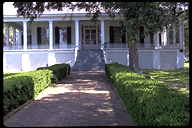
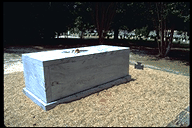 It was in Biloxi that I picked up the trail of Jefferson Davis. His
last home was here on a peaceful estate that has been converted into a
shrine by the Daughters of the Confederacy and includes the
confederate Tomb of the Unknown Soldier. I drove from there into the
Garden District of New Orleans where Davis died in 1889. After a 17
mile tour of the beautiful city by bike, I showered and changed into a
coat and tie for dinner at Galatoire's, a 1905 brasserie in the French
Quarter.
It was in Biloxi that I picked up the trail of Jefferson Davis. His
last home was here on a peaceful estate that has been converted into a
shrine by the Daughters of the Confederacy and includes the
confederate Tomb of the Unknown Soldier. I drove from there into the
Garden District of New Orleans where Davis died in 1889. After a 17
mile tour of the beautiful city by bike, I showered and changed into a
coat and tie for dinner at Galatoire's, a 1905 brasserie in the French
Quarter.
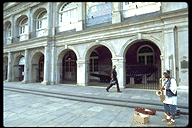 Dinner was a real scene. Each regular customer came in and asked for
a waiter by name. A lot of the men had jowls bearing witness to
expense account dinners gone by. Women were escorted. Period. The
food was superb but I've gotten to the point in life where I'd rather
meet a new person than try a new restaurant.
Dinner was a real scene. Each regular customer came in and asked for
a waiter by name. A lot of the men had jowls bearing witness to
expense account dinners gone by. Women were escorted. Period. The
food was superb but I've gotten to the point in life where I'd rather
meet a new person than try a new restaurant.
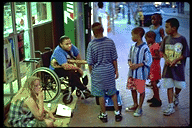 I was ready for
Bourbon Street. I had my exotic Canon 50mm f/1.0--the
fastest lens in the world--ready for low-light atmospheric
photography. I imagined a passed-out drunk in the gutter, a
black-stockinged hooker under the street lamp, and a jazz trio playing
in a bar in the background. What I got was a tourist clad in a
T-shirt reading "My mother went to Miami Beach and all I got was this
lousy T-shirt." Apparently the working girls and bums don't come out
until after midnight. I was too tired to wait around in the 90 degree
heat and 90% humidity. I went back to the air-conditioned youth
hostel and chatted with the usual assortment of Australians and
Belgians.
I was ready for
Bourbon Street. I had my exotic Canon 50mm f/1.0--the
fastest lens in the world--ready for low-light atmospheric
photography. I imagined a passed-out drunk in the gutter, a
black-stockinged hooker under the street lamp, and a jazz trio playing
in a bar in the background. What I got was a tourist clad in a
T-shirt reading "My mother went to Miami Beach and all I got was this
lousy T-shirt." Apparently the working girls and bums don't come out
until after midnight. I was too tired to wait around in the 90 degree
heat and 90% humidity. I went back to the air-conditioned youth
hostel and chatted with the usual assortment of Australians and
Belgians.
 Friday, June 17
Friday, June 17
Anxious to fill a few gaps in
Heather has Two Mommies, I
stopped by the
zoo, named after famed Louisianan James Audubon. It
held me for nearly the entire day with its naturalistic enclosures,
soulful orangutans, multi-species African area (rhinos, egrets,
turtles, pelicans, ruminants), and Louisiana swamp. The place was
mobbed with kids, many surprisingly portly.
I battled horrific traffic and torrential rain to get out of town, all
the while contemplating the weird California-inspired practice of
spelling Louisiana on the license plates LoUiSiAna (too bad
LoRi-with-a-heart-over-the-i is in Europe and can't read this :)).
The Interstate out of town provides a great view of the elaborate
vaults in New Orleans's above-ground cemeteries then crosses the
Atchafalaya Basin (swamp) on the longest Interstate bridge I can
remember. The achievement of civil engineers awes me at times. For
about 30 miles, they'd elevated four lanes of highway on concrete
pillars punched into the swamp about 20 feet below. It had survived
hurricanes and the general atmosphere of decay. Why can't software be
engineered like that?
I stopped in Lafayette ("laugh-yet") for dinner at Paul Prudhomme's
sister Enola's Cajun Cafe. Somehow I couldn't stop myself from dining
on crawfish and fried alligator.
High-speed driving until 1 a.m. got me through Shreveport and into the
Canton Best Western 60 miles east of Dallas.
Saturday, June 18
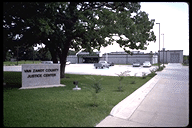 Downtown Canton beckoned just a mile or so past some scrubby cattle
ranches. All the buildings looked as if they'd been built during
wartime and had suffered quite a few years of decay besides.
Corrugated steel and collapsing wood frame were the preferred styles.
I couldn't believe my eyes as I came across the "justice center," an
enormous magnificent brand-new palace complete with shade tree in
front. Not only did it look like the only structure to have been
built in the last 15 years, it was of an astonishing size for a town
of 2949.
Downtown Canton beckoned just a mile or so past some scrubby cattle
ranches. All the buildings looked as if they'd been built during
wartime and had suffered quite a few years of decay besides.
Corrugated steel and collapsing wood frame were the preferred styles.
I couldn't believe my eyes as I came across the "justice center," an
enormous magnificent brand-new palace complete with shade tree in
front. Not only did it look like the only structure to have been
built in the last 15 years, it was of an astonishing size for a town
of 2949.
It hit me all of a sudden. The only decent buildings in most parts of
the US are casinos, hospitals, courts, and schools. It is easy to
forget this in big cities where industrial monuments tower over all
else. Through the South, though, it was just these four even in towns
as large as Memphis. Up and down the Mississippi, it has somehow been
decided that "riverboat gambling" is OK and the casino empires have
responded with glittering oases.
The poverty that is endemic in so much of the South is bad for most
businesses, but great for the health care industry. They might
complain about taking care of Medicaid patients, but the fact remains
that Medicaid costs $4000/year, about twice as much as private
insurance. Some of that $4000 is absorbed by paper shufflers, but
there is still plenty left over for the hospitals and doctors. Modern
bustling hospitals thrive even in small towns.
In Cambridge, the Drug War isn't good for much besides debate. Rich
kids don't go to jail for possessing drugs, prisons aren't built in
downtown areas, and people with Harvard degrees don't become cops or
small-time defense lawyers. In the rest of the country, though, the
Drug War is an industry and a way of life. Police departments get to
hire more personnel and buy shiny new cars (about the only new cars
you see in some towns). Contractors get rich building new courthouses
and prisons. Government swells with prison guards, judges, clerks,
and administrators. Lawyers get paid to prosecute offenders and
defend them. It is a good thing we have plenty of poor young people
without any political power to send to jail. Gazing at the Memphis
courthouse, gleaming after its $6 million remodeling, it occurred to
me that if middle class white people were going to jail instead of
making a buck off the Drug War, the nation's enthusiasm for it might
abate.
If people are using drugs, it is not for want of proper education.
Not only is every urinal in North Carolina equipped with a "Say no to
Drugs" plastic soap holder in the bottom, but the anti-drug message is
being delivered from a lot of nicely renovated schools. Kids may be
idiots, but the physical plant at least bears witness to the
ever-increasing share of gross national product devoted to education.
Speaking of education, as I drove into downtown Dallas, a billboard
sold a Christian academy with the following points: No Drugs, No Guns,
No Condoms, No Sex Education, No Compromise (all in letters six feet
high). I wonder what will happen when they get on Internet...
 I stopped at State Fair Park to see its Art Deco treasures and
stumbled upon the remains of the previous night's World Cup soccer
match. One hundred thousand people shelled out $50 to $150 to fill
the Cotton Bowl. A security guard who'd been there said it was
moderately crazy. Did you seen any Americans? I asked. "No. People
came from all over. Argentina, Spain, German, Austin..."
I stopped at State Fair Park to see its Art Deco treasures and
stumbled upon the remains of the previous night's World Cup soccer
match. One hundred thousand people shelled out $50 to $150 to fill
the Cotton Bowl. A security guard who'd been there said it was
moderately crazy. Did you seen any Americans? I asked. "No. People
came from all over. Argentina, Spain, German, Austin..."
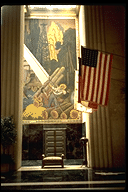 Texas history under all six flags (Spain, France, Mexico, Republic of
Texas, US, and Confederate in that order if I'm not mistaken) is
glorified in the State Hall. I was the only visitor and Willie Cooper
amplified the exhibits with some of the history he'd seen during his
69 years in Texas. Willie served in WWII and the Korean War before
coming back to Texas to help build a motel. He ended up managing the
motel also, which was ironic because at the time (1958), blacks
couldn't stay there. He came up to Dallas from a small town to
distribute newspapers.
Texas history under all six flags (Spain, France, Mexico, Republic of
Texas, US, and Confederate in that order if I'm not mistaken) is
glorified in the State Hall. I was the only visitor and Willie Cooper
amplified the exhibits with some of the history he'd seen during his
69 years in Texas. Willie served in WWII and the Korean War before
coming back to Texas to help build a motel. He ended up managing the
motel also, which was ironic because at the time (1958), blacks
couldn't stay there. He came up to Dallas from a small town to
distribute newspapers.
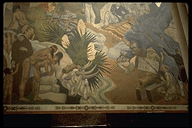 "I married a woman who couldn't cook so I had to learn to. That's why
most my eight children have gone into cooking. One of them ran a
donut shop until he got too successful and they shut him down. When
you get successful, there's no end of people shooting at you."
"I married a woman who couldn't cook so I had to learn to. That's why
most my eight children have gone into cooking. One of them ran a
donut shop until he got too successful and they shut him down. When
you get successful, there's no end of people shooting at you."
He asked me why I wasn't married. I said I couldn't understand it
either. After all, I expected no more from a wife than Admetus got
from Alcestis.
"You know there was a slave woman here who was traded for 1500 pounds
of sugar. She must have been one sweet woman. All women are sweet if
you know how to stir them up. Otherwise the sweetness just stays in
lumps at the bottom."
What's the trick to stirring?
"You can't be mad. If you are mad you are just going to stir up
anger. If you are sweet you'll stir up sweetness. You've got to make
sure you don't get too crazy about a woman. Otherwise you'll end up
like O.J. Simpson. If one of them leaves, it is just a matter of time
before another one comes along."
How long did his marriage last?
"Forty-eight years and nothing could have been easier."
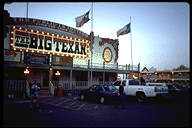 As I endured the 350 miles of US 287 that separate Fort Worth from
Amarillo, I recalled the words of my friend Mike from Houston: "God
made Texas and then saw that it was dry, flat, hot, and filled with
sagebrush and scrub. He thought about reworking it but then decided
to just make some people who like land like that."
As I endured the 350 miles of US 287 that separate Fort Worth from
Amarillo, I recalled the words of my friend Mike from Houston: "God
made Texas and then saw that it was dry, flat, hot, and filled with
sagebrush and scrub. He thought about reworking it but then decided
to just make some people who like land like that."
When I reached I-40 and Amarillo, I stopped for dinner at the Big
Texan. I decided against joining the 22,000 people since 1959 who've
tried to eat a free 72 oz. steak dinner. I wasn't scared by the $50
charge if one doesn't manage to eat the whole thing, including shrimp
cocktail, salad, rolls, potato, etc. in one hour. The fact that 4,000
have succeeded, including a 63 year-old grandmother and an 11 year-old
boy, didn't interest me much either. When I looked at the 72 oz.
steak, it occurred to me that a Samoyed dog could have the thing down
in about 3 minutes, although he might balk at the salad.
I pitched my tent at the Tucumcari KOA, only hundreds of yards from
the soothing sounds of the Interstate.
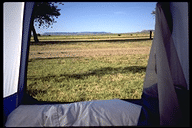
Sunday, June 19
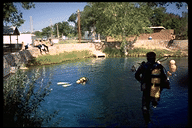 Santa Rosa calls itself the SCUBA diving capital of the Southwest.
Sure enough, mobs of divers crowded around the Blue Hole, an artesian
well about 30 ft. in diameter and 80 ft. deep. Most of them were
getting certified. Somehow it didn't seem fair that they got
certified by stepping off a diving board while I had to walk 200 yards
down a rocky beach in Hawaii, then swim 200 more yards out through the
heavy surf of Oahu in the winter.
Santa Rosa calls itself the SCUBA diving capital of the Southwest.
Sure enough, mobs of divers crowded around the Blue Hole, an artesian
well about 30 ft. in diameter and 80 ft. deep. Most of them were
getting certified. Somehow it didn't seem fair that they got
certified by stepping off a diving board while I had to walk 200 yards
down a rocky beach in Hawaii, then swim 200 more yards out through the
heavy surf of Oahu in the winter.
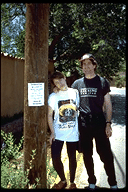 Susie and Stephen greeted me in Santa Fe and we caught up on events
since March. I went downtown to get a library card and some
guidebooks and discovered that the Santa Fe library doesn't have
overdue fines! Talk about a New Age we can live with. I guess they
just visualize a world where people return books.
Susie and Stephen greeted me in Santa Fe and we caught up on events
since March. I went downtown to get a library card and some
guidebooks and discovered that the Santa Fe library doesn't have
overdue fines! Talk about a New Age we can live with. I guess they
just visualize a world where people return books.
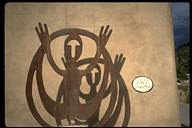 I biked up Canyon Road from Susie's house and found myself quickly on a dirt road 500
feet above the city. It was poetically beautiful, especially after
all those miles of flat country. The sun played cat-and-mouse with a
variety of ominous dark thunder clouds, but there were always broad
swatches of blue sky with white clouds visible. Adobe houses glowed
golden and the Sangre de Cristo mountains, the southernmost range of
the Rockies, glowed red enough to justify their translation: "Blood of
Christ."
I biked up Canyon Road from Susie's house and found myself quickly on a dirt road 500
feet above the city. It was poetically beautiful, especially after
all those miles of flat country. The sun played cat-and-mouse with a
variety of ominous dark thunder clouds, but there were always broad
swatches of blue sky with white clouds visible. Adobe houses glowed
golden and the Sangre de Cristo mountains, the southernmost range of
the Rockies, glowed red enough to justify their translation: "Blood of
Christ."
Monday, June 20
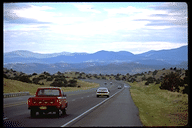 I rose at 6 am to drive "up the hill" to Los Alamos, 45 minutes from
Santa Fe. It was pouring rain for the first half of the drive, but I
could see mountains 50 miles away. You won't be here long before you
understand why Georgia O'Keefe could spend a whole summer painting
clouds. When it does rain, the clouds have the good grace to remain
high above the ground so you can enjoy the saturated colors of nearby
objects and the brightly illuminated landscape in the distance.
I rose at 6 am to drive "up the hill" to Los Alamos, 45 minutes from
Santa Fe. It was pouring rain for the first half of the drive, but I
could see mountains 50 miles away. You won't be here long before you
understand why Georgia O'Keefe could spend a whole summer painting
clouds. When it does rain, the clouds have the good grace to remain
high above the ground so you can enjoy the saturated colors of nearby
objects and the brightly illuminated landscape in the distance.
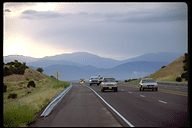 We spent the morning signing forms in a big group. With each form,
the woman would say "sign at the bottom and put today's date,
6/20/94." Nobody blinked when they signed away their intellectual
property rights on a dense two-page form we were given 15 seconds to
read. Nobody minded swearing to defend the Constitution of the State
of California against domestic and foreign enemies even though we
hadn't been shown a copy. (I asked for a copy and the 21 year old
running the show glared at me. I really just wanted to see if it
guaranteed citizens sunflower seeds and self-esteem. California comes
up because we are all University of California employees officially,
under contract to the Department of Energy.) However, when the woman
slipped after ten times and said "sign at the bottom and put today's
date, 6/14/94," everyone stopped. They looked up in unison and asked
"6/14?"
We spent the morning signing forms in a big group. With each form,
the woman would say "sign at the bottom and put today's date,
6/20/94." Nobody blinked when they signed away their intellectual
property rights on a dense two-page form we were given 15 seconds to
read. Nobody minded swearing to defend the Constitution of the State
of California against domestic and foreign enemies even though we
hadn't been shown a copy. (I asked for a copy and the 21 year old
running the show glared at me. I really just wanted to see if it
guaranteed citizens sunflower seeds and self-esteem. California comes
up because we are all University of California employees officially,
under contract to the Department of Energy.) However, when the woman
slipped after ten times and said "sign at the bottom and put today's
date, 6/14/94," everyone stopped. They looked up in unison and asked
"6/14?"
After the forms ceremony, I had to go through eight hours of General
Employee Training. It is apparently not OK to remove A-bombs from Los
Alamos property. Nor are we allowed to gamble or use drugs here. Nor
can one use a fire extinguisher unless one has been trained with a
"real dummy fire extinguisher" and "real dummy fires." Then we were
shown a 10-minute video on how to use the fire extinguishers we
weren't allowed to use. At the end I raised my hand and asked "since
we aren't allowed to gamble, are we going to get a video on how to
card count in six-deck blackjack also?"
That the face of Los Alamos is changing was readily apparent from the
complexion of my fellow new hires. Sarah, an attractive stylishly
dressed graduate student at the Monterey Institute, was being trained
to tell former Soviet Empire subjects to "just say no" to nuclear
proliferation. Kathy was going to work in training. A whole slew of
people were going to work in environmental studies. One of Sarah's
old chums from Dartmouth was going to try to figure out what happened
back in 1940's when they pumped radiation into human beings. Those of
you who've seen me cry like a baby and run to Mommy Maple for even the
simplest calculus problems will be shocked to learn that I was the
nerdliest person hired that week.
Fortunately the street names don't reflect the nation's wimpy new
soft-on-Communism attitude. I got to my cubicle by turning left on
Oppenheimer, right on Trinity, and best of all, left on Bikini Atoll.
They said I'd be stuck in a trailer, but my cubicle was actually in a
double-wide mobile home, part of three glommed together in the middle
of a vast parking lot.
 Los Alamos
Los Alamos
Related Links
philg@mit.edu
Add a comment | Add a link
 I arrived in Washington, DC for a Senegalese dinner with
Meredith, a
public interest lawyer. The food was pretty good but the national
drink of Senegal, sorel mixed with vanilla, made me understand why
Coke is so popular in the Third World. Northwest DC always strikes me
afresh with its beautiful architecture and endless yuppie playgrounds.
Northwest DC has Georgetown, Adams-Morgan, Dupont Circle, "the New U
Street", and nearly everyone who lives in Northwest makes enough money
to enjoy it all. There is an association and job for everyone here.
Meredith and I sat in wonder at the beautiful brick townhouse that
serves as the headquarters for the Association of Special Libraries.
I arrived in Washington, DC for a Senegalese dinner with
Meredith, a
public interest lawyer. The food was pretty good but the national
drink of Senegal, sorel mixed with vanilla, made me understand why
Coke is so popular in the Third World. Northwest DC always strikes me
afresh with its beautiful architecture and endless yuppie playgrounds.
Northwest DC has Georgetown, Adams-Morgan, Dupont Circle, "the New U
Street", and nearly everyone who lives in Northwest makes enough money
to enjoy it all. There is an association and job for everyone here.
Meredith and I sat in wonder at the beautiful brick townhouse that
serves as the headquarters for the Association of Special Libraries.
 Saturday, June 4, 1994
Saturday, June 4, 1994

























 The Jimmy Carter Presidential Library does something amazing, i.e.,
make you believe that Carter was an immensely effective president. By
concentrating on Carter's achievements and ignoring failures, the
exhibits make it sound as though he spent four years working hard on
them and never wasted any time on failures. My favorite exhibit
explicitly stressed the importance of First Ladies; they were all
represented by dolls.
The Jimmy Carter Presidential Library does something amazing, i.e.,
make you believe that Carter was an immensely effective president. By
concentrating on Carter's achievements and ignoring failures, the
exhibits make it sound as though he spent four years working hard on
them and never wasted any time on failures. My favorite exhibit
explicitly stressed the importance of First Ladies; they were all
represented by dolls. 






















